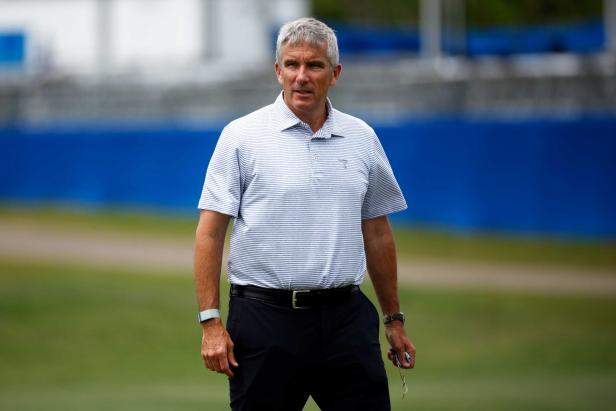With the arrival of LIV Golf and the PGA Tour’s need to respond to the riches being offered by its new Saudi Arabia-backed rival, greater scrutiny of the U.S.-based circuit’s finances has logically followed. After all, Commissioner Jay Monahan already has acknowledged that the PGA Tour could not prevail against LIV if the competition for players simply came down to dollars.
Still, some close pieces of examination are more routine than others, and thus there are reports such as the one published by the Wall Street Journal on Wednesday that probably makes the tour’s leadership queasy.
The Journal documented in detail Monahan’s use of a tour-owned private jet for both business and personal travel, as well as citing the commissioner’s 2020 compensation of $14.2 million. The story noted Dustin Johnson was the only player to eclipse that total because he won that season’s FedEx Cup title. (The actual yearly pay, the tour told the Journal, for Monahan was $8.3 million, with the rest of money being long-term incentive pay and future retirement benefits accrued.) In regard to the plane, the Journal reported that the PGA Tour owned a company named Tour Air Inc., and began leasing a jet in 2011. It then purchased the Citation X aircraft last year, according to Federal Aviation Administration (FAA) records.
In the Journal’s research, it identified more than two dozen flights in 2022 to airports that were near tour events on the dates they were being played. For the Masters, as an example, the plane flew four times between the tour’s headquarters in Ponte Vedra Beach, Fla., and Augusta, Ga.
The Journal cited various other trips taken, some personal (to Colorado and Massachusetts) and some mixing business and personal flights. Among the most notably interesting flights was one Monahan took this past June to Turks and Caicos for the wedding of then tour player Brooks Koepka. Not long after, Koepka defected to the LIV Golf tour after initially saying he would not do so.
Responding to questions about Monahan’s use of the plane for personal reasons, the PGA Tour told the Journal that Monahan is required by its Policy Board, which includes players, to use the corporate plane for all business and personal air travel because it provides the “necessary level of efficiency, privacy and security.”
The Journal also reported that the PGA Tour, as a non-profit, chose in 2020 to detail its spending on its tax return in a manner that one non-profit tax lawyer called into question. The Journal reported that narrative descriptions of the benefits obtained by certain PGA Tour officials, including the flights, are not available in the tour’s tax filings, as required for non-profit organizations. The most recently available filing from 2020 for the PGA Tour says that, in “limited cases,” top executives “may utilize charter or first-class travel for business” trips, citing security, privacy or efficiency reasons.
The filing does not specify that the “charter” flights could be on the airplane it owns.
“Given that the organization mandates the use of chartered jets for personal travel, the disclosure on the 990 [tax filing] is at best misleading and at worst intentionally inaccurate,” Elizabeth Kingsley, a Washington lawyer who advises nonprofit organizations, told the Journal.
In a response to a request from Golf Digest on Wednesday for comment on the WSJ report, the PGA Tour issued this statement: “The PGA Tour Policy Board maintains close oversight of the utilization of the corporate plane, and all use is completely approved and appropriate. The tour’s Form 990 is routinely reviewed by our outside 501c6 organization specialists, and we are compliant with all disclosure requirements.”
The questions the tour faces about the way it spends money come at a time when the pot of money made available to players is larger than it’s ever been. The tour provided a financial document to the Journal that projected it would use $32 million from its reserves in 2022 to fund player earnings, and it said that 55 percent of its $1.52 projected revenue would go to the players.
